I have just given an intrigued couple of hours to musing over the outstanding new Common Cause report, which explores the battle over cultural values that underlies communications and marketing, while keeping one eye always on our environmental challenges.
The report has both stimulated a fair bit of controversy (as I will explore below the cut) and, excitingly, provided an answer to a question that has been bothering me for many years now, since reading Edward Bernays’ influential 1928 book Propaganda.
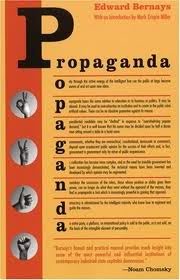
(full text available online here or here)
First, then, a little history. Bernays was the nephew of Sigmund Freud, and the pioneer founder of the industry now termed “Public Relations” (the “Propaganda” name being discarded due to associations with the German war effort). Building on his uncle’s ideas about subconscious urges and desires that drive our decisions, Bernays argued that:
“The conscious and intelligent manipulation of the organized habits and opinions of the masses is an important element in democratic society… We are governed, our minds are moulded, our tastes formed, our ideas suggested, largely by men we have never heard of. This is a logical result of the way in which our democratic society is organized. Vast numbers of human beings must cooperate in this manner if they are to live together as a smoothly functioning society…In almost every act of our daily lives…we are dominated by the relatively small number of persons…who understand the mental processes and social patterns of the masses.”
To my mind this is pretty distasteful stuff, but it has undoubtedly proved a significant force in shaping the consumerist society around us. We may disapprove of the marketers, PR men and spin doctors invading our minds at every opportunity, but we cannot deny the power of the techniques Bernays developed.

All of which brings us back to that uncomfortable question: given the urgency of the peril facing our biosphere, and the potency of this approach, is there a way to justify such manipulation for the sake of preserving a future for all (as indeed many are trying to do)?
On those terms, I have always leant towards the answer “no”. But Common Cause offers a potential way to harness this potency without being manipulative: transparency.
By all means understand and utilise all the power inherent in your messaging, but be explicit about the values you are trying to promote, and explain why.
Like most important insights, this solution is simple yet powerful, for by this one act you not only bring integrity to your efforts to spread the values you believe in, but also simultaneously open up an important debate over the desirability of those values AND shine a light on the dubious morality of all those doing similar work from the cover of darkness.
For me, it is a great relief to see a niggling question laid to rest in such an elegant way, and I am grateful for it.
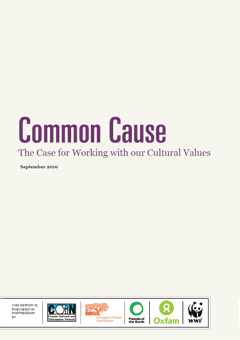
Yet in reading around the report, I discovered that others, such as Solitaire Townsend of Futerra, disagree, and forcefully so. She writes:
“The notion of changing the audience rather than the message is at the heart of (this) concept. It argues that we shouldn’t accept the basic psychology of our audience – but seek to change it.
This means re-programming people’s values away from consumption, status and selfish desires and towards collective awareness and a closer relationship with our place in the natural world. Actually this drives us (at Futerra) bonkers, especially because implicit is the message ‘if only everyone else thought and acted like us everything would be okay’.
That makes our skin crawl a bit, and we know the majority public audience hates environmental worthies suggesting there’s not only something wrong with their footprint: there’s something wrong with their personality.”
I have often felt myself recoil from Futerra’s approach to “promoting sustainable development”, and this helped me to put my finger on why.
As report author Tom Crompton pointed out in his response, all messaging changes the audience. While I agree with Solitaire that this fact is in some ways distasteful, for me the appropriate response to this distaste is not to pretend that one’s own messaging is somehow exempt from having such influence, but rather to explore the reality behind this dangerous power, and to seek a way to use it in an honest and beneficial way.
Common Cause‘s radical transparency provides exactly that and, promisingly, the report is supported by five influential NGOs (including, incidentally, some that I have personally decided to stop supporting).
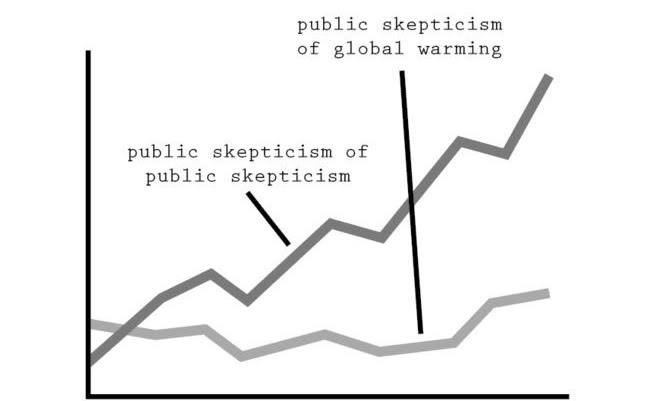
But I think there is a wider issue rearing its head here too; a logical flaw that underpins much modern discussion, especially when it comes to our environmental challenges.
When Solitaire goes on to argue that “we don’t have time for a cultural shift” and so that we must engage with people where they’re at, her argument is that approach A can’t possibly work, so we must try approach B.
We see the same form of argument all over the place. Renewables can’t scale up quickly enough to replace fossil fuels so we must have nuclear power. The Conservatives and Liberal Democrats aren’t running the country well, so we must vote Labour. And on and on.
But the premisses and the conclusion do not join up. Even if we accept that A doesn’t work, it doesn’t necessarily mean that B will. Indeed, B could be far far worse, this argument just doesn’t tell us. This much is evident at a glance, yet still this form of argument is everywhere, and generally treated with respect.
The alternative is to face the possibility that maybe none of the options presented are satisfactory. Maybe we truly don’t have time for a cultural revolution AND ‘ethical consumerism‘ truly can’t save the world. Maybe neither renewables NOR nuclear can sustain a consumerist society over the coming decades. And so on…
It is when we explore this space – when we consider the evidence on all the propositions, rather than assuming that the last remaining option simply MUST work – that we start to consider reality, and thus open the door to true creativity.
Perhaps none of the mainstream parties are satisfactory, so I should support a smaller one, or not vote at all, or start my own, or work to change the political system, or…
Perhaps none of today’s technologies can power a consumerist lifestyle for all the world’s people, so we need to accept vast inequalities, or reduce our energy demand, or redefine our idea of a desirable lifestyle, or…
Let’s not assume that the truth must always be found laid out among the presented options.
As I mentioned in response to comments on an earlier post, I believe that refusing to flee to quick, unexamined answers is one of our key strategies at this point in human history, as the limits of our current paradigms loom ever larger. We must explore new stories.
As Rilke so beautifully put it:
“Be patient toward all that is unsolved in your heart and try to love the questions themselves.
Do not now seek the answers, which cannot be given you because you would not be able to live them. And the point is to live everything.
Live your questions now, and perhaps even without knowing it, you will live along some distant day into your answers.”


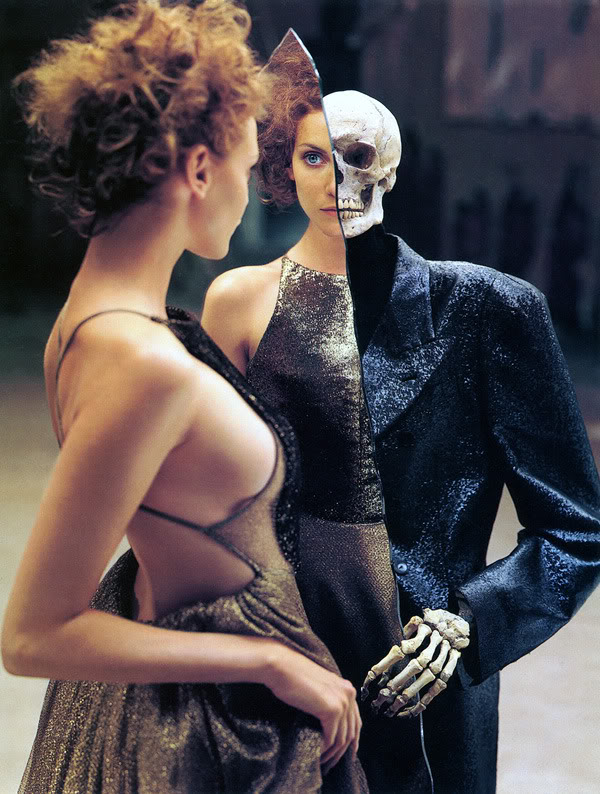
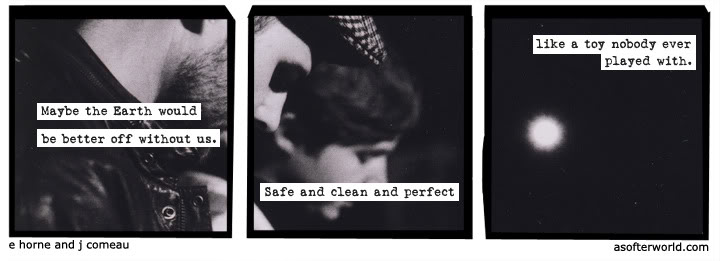

Good questions in your blog and love the Rilke quote, just what I needed to read ! Thanks !
hmmm.
life, even the simplest plankton, is so highly ordered as to seem to some incredible.
order tends to chaos.
all that is possible is to prolong the inevitable decline to ash.
a cliche; the planet is ill. we can try to get better, or we can die gracefully.
it is not obvious what to do, as ‘better’ is different for different people, similarly the prospect of dying is unattractive to some.
without determining that there is a universal truth of some kind, from which it follows that some people are ‘right’ and some ‘wrong’ (a religion or faith), no action can be taken.
what is your faith?
Totally agree with your sentiments up to the last paragraph or two, my friend. Certainly from a philosophical perspective, and on an epic timescale, our best understanding (but still I think what you would term a ‘faith’) is that life itself must end. Which, in combination with the inevitability of our death as individuals, makes it clear to me that the point of life is not simply to extend life indefinitely.
Thus far we agree. And certainly different people choose different values, with, for example, some choosing what they see as a good death over a long life, and others not.
But to thus conclude that no action can be taken without a sense of universal truth appears to be a mistake.
Isn’t the truth rather that we cannot not change the world? To imagine that one can somehow be neutral on the sidelines and refuse to engage with the world is in essence the same mistake that Solitaire makes in claiming she is unwilling to change people through her messaging.
It is not that, as you say, without faith no action can be taken. Quite the opposite. It is impossible to take no action, whether one has ‘faith’ or not.
So we are left doing our best, without any of the certainty or guarantees that we might wish for.
In fact, I believe that (the illusion of) certainty is one of the most dangerous forces in our world. As the Rilke quote above hints, we are never ready to live all the answers, and we do well to remain open to the sense that there may be some overwhelmingly important thing that we have yet failed to understand. If I have a ‘faith’, it is probably that!
Which of course leaves me living with perpetual difficult judgements and hard work aplenty, because when I step back from the philosophical and the epic, I see suffering and injustice that pains me, and I see how my choices have been supporting that. And I try to let the philosophical and the immediate – insight and (com)passion – inform each other.
But I notice that while I’m honestly exploring the questions and challenges that this raises and acting as the exploration demands of me, at the deepest level in me my heart feels (I don’t know a right word – love? content? pure?), which I guess is the guide I trust the most.
The ‘faith’ you appear to espouse of refusing to even consult one’s heart because of a set of reasonings about the nature of truth, seems to me to be one that has led to all manner of atrocities, and to reflect a mistaken understanding of your self and the true inevitability of acting.
We all choose actions. And we have our reasons for our choices, which you term a ‘faith’. Denying that one’s ‘faith’ is a ‘faith’ doesn’t change that.
I fear you might have misconstrued my response.
Firstly: you use the collective ‘we’ in ways I don’t understand:
‘we are left doing our best’ (nobody I know is doing anything close to the most they can towards changing the world in any way).
‘we cannot not change the world.’ (presuming change means environmental change of some kind it seems trivially possible to make no change).
Secondly, you seem confused re. faith and absolute truth:
You follow a comment that ‘the illusion of certainty is one of the most dangerous forces in the world’ with the expression ‘if I have a faith, it is that’. This appears almost paradoxical, the apparent get-out clause being that you know that your faith is ‘one of the most dangerous forces in the world’.
After a poetic paragraph about feelings in your heart that I don’t understand, you make the accusation that I am ‘espousing’ a faith that you summarise as the refusal to even consult one’s heart. You are putting words in my mouth here: I don’t use the term ‘listen to the heart’ because, in a non-medical context, I don’t find it very useful.
I am content to file your response here as emotional rather than rational due to these issues as well as some bothersome implied assumptions and simple libel (the statement that I have a mistaken understanding of myself).
I think you would do well to consider that I may be in a more informed position as to what I myself think or do not think than you. If you find yourself able to accept this concept, you may then be able to apply it to others too. You may find this useful.
Hi Chay,
Apologies if I misconstrued you.
In fact no, I wasn’t referring to environmental change specifically, but was just saying that in the absence of certainty we simply have to do our best in choosing our actions in life, on the basis of whatever principles or faith we adhere to. And that our choices do impact the world.
I understood your first post to be saying that one cannot take action without faith in a universal truth of some kind, and thus asking me what my faith is.
I answered that despite the fact that I do take actions, I personally don’t subscribe to a certainty in any universal truths. But I am very aware that the usual comeback to that is to reply that that statement sounds very much like a faith in a universal truth. Which I think is fair comment, so I acknowledged openly that if that counts as a ‘faith’ in your terms, then I subscribe to it. Yet, as you say, it has an inherent ‘get out clause’ in that I am always open to changing it too 🙂
I’m really not sure why you think I believe myself to be a higher authority on what you think. I don’t, and all I said was that you appeared to me to be espousing a particular belief, and that that belief seems to me to be based on a logical error, as I had explained. Apols if my explanation wasn’t clear enough, or if my reference to ‘the heart’ was unhelpful to you. Thought it might stimulate a productive conversation, is all! Never mind
Oh dear, sorry.
I don’t like the phrase ‘… we simply have to do our best’:
1. ‘we’ presumably means a bigger group of people than just yourself
2. ‘simply’ implies that the statement is non-trivial and obvious (when I do not think it is at all)
3. ‘have to’ implies ‘we’ have no choice in the matter
4. ‘our best’ is a different goal achieved in a different way for different people.
The reason I brought faith into it is because statements like the one above are seemingly absolutist. ”Faith’ is to me a commonly held set of absolutist values. Without this concept, the above statement, for the reasons given, loses meaning as soon as it is transferred from one individual to another.
The part of your post that led me to think you believed yourself to be a higher authority on what I think was this:
“The ‘faith’ you appear to espouse of refusing to even consult one’s heart because of a set of reasonings about the nature of truth,”
This is a statement that seems to lambaste a faith you suggest I hold because it is based on [suppressing emotional feedback?] as a result of a set of reasoning you presume to be incorrect.
The frequent use of the collective ‘we’ in conjunction with phrases like ‘have to’ or ‘impossible not to’ suggest that you are addressing the public as a whole, and not only suggesting that you would like them to do something-or-other, but asserting that there is no alternative.
You might well not like the alternative, or think that it is very stupid, but many people welcome it, and many more without realising gratuitously are bringing it about.
Without an absolute truth, or faith, who is to say who is right or wrong?
This is all very boring for your readers anyway.
Here is a metaphor, which is not a perfect fit but still fun:
What is better, growing old and dying, or desperately trying more and more extreme measures in a frantic bid to maintain one’s youth?
Perhaps as a world, we’ve had our fun?
Propaganda is ok as long it’s “our” values we push onto others, and as long as there is “transparency,” whatever that means in the context? Ugh.
I am going to abstain myself from Shaun & Chay’s debates, partly because (as usual) I think you agree on more than you appear to be with many of your disagreements simply down to semantic misreadings.
I just wanted to comment on this:
“It is when we…consider the evidence on all the propositions, rather than assuming that the last remaining option simply MUST work – that we start to consider reality, and thus open the door to true creativity.” This is what I think of as true science (and its meeting with art).
Hi Vera,
I think that if you read the report (esp. Chap 4) you might find it less distasteful than you have found my characterisation.
It documents the extensive evidence that shows that *all* our communications transmit and strengthen values and frames, so really the distaste we feel for ‘propaganda’ is that it is doing so in a manipulative/deceptive way, claiming to be delivering one message when in fact reinforcing others, or hiding part of the truth.
There is no suggestion of different standards for “our” values and “their” values, but rather the argument that it would do the world a great service if all messaging transparently published the values it is grounded in, and an analysis of the deep frames the messaging is reinforcing, and opened those up for debate and interaction from all interested/affected parties.
The apparent alternative of just refusing to use any messaging that contains any embedded values whatsoever is not possible. So this report seeks to answer the difficult question of how best to use such messaging. I think it does a very good job.
Edit – PS: although I suppose really the report is explicitly addressing ‘mass messaging’, so there is the alternative of refusing to participate in that. Which would have my strong sympathy in fact..
Thanks Becci, totally agree on both counts 🙂 I think Chay and I will do better to chat further in person!
For what it’s worth, the best definition of Absolute Truth that I have come across is from Henryk Skolimowski, that Absolute Truth “is one gigantic truth about the whole universe in its transformation and unfolding”.
To what extent can the part comprehend the whole? To my mind, the Absolute Truth is unknowable, or at least unspeakable – and therefore we should hold our own truths lightly as we know that they are only partial truths.
Really enjoying this website, thanks Shaun.
Also, thanks to all those who have commented on this blog, so far, for their insights and thoughts.
Peace
Great Blog Shaun! Thanks for the insightful commentary. Reminds me of a Jungian quote I adore… “What is not brought to consciousness, comes to us as fate”. In other words, we can escape awareness of the consequences of our actions or the actions themselves, but not both…. Be great to find updated posts on your FB page 🙂 Cheers, Grace
*The fourth line should read “or the consequences themselves” rather than “or the actions themselves” 🙂
Thanks Grace, good quote. And yes, getting the Facebook page set up is on my list!
Hey, dark optimists, come check out my latest paean on John Holloway’s insights. 🙂
https://leavingbabylon.wordpress.com/2010/10/11/logic-of-power-i/
@ Shaun – Great! Look forward to it 🙂
BTW, has anyone read The Political Brain? If not, I’d highly recommend it. It’s an insightful book that dove tails nicely with the latest in behavioural economics/this blog post…
Namaste
Hi Grace and all,
Facebook page is now up-and-running, with updates from both my blog and my Dark Optimism Twitter account. You can find it at:
https://is.gd/g6V5I
I’ll be adding more content and promoting it soon, but would be good to get a few early eyes on it to point out any glitches/oversights, try out the “discussions” section etc!
Cheers,
Shaun
A good record of the state of the debate around Common Cause was published yesterday:
https://becominggreenblog.blogspot.com/2010/11/common-cause-debate.html
Really enjoyed this post.
Challenging obvious answers to issues, option ‘B’ of often the next one in line from ‘A’ but that doesn’t mean there aren’t others. There is a need for some speed with this of course, solutions are needed to climate change but framing our options with the assumption that people won’t change unless you fit within their pre-existing parameters is cutting off one’s nose to spite one’s face.
Whilst musing on what guides human impulses we risk falling into a trap which credits marketing with too much power. Yes it grabs attention, but then that’s what it is for. Marketing, PR and propaganda do not generate issues but they do perpetuate them.
I believe that real power lies with actual products, services and utilities we use. Marketing is simply a conduit, neither good not bad in itself. One can rail against it but ultimately one is getting upset with the (rather annoying, shiny, over-hyped) messenger.
Power is in manufacture – our power, our products, our services – these all come from businesses who mainly wish to perpetuate themselves by encouraging us to believe in their output, to love their brand.
When manufacturers decide to change their ways then marketing changes and becomes more open. Hybrid cars are an interesting example. I’m no big fan of cars but hybrids and the way they are advertised is quite transparent because the truth of the product is that they are a positive alternative to normal cars.
Conversely, oil companies don’t really care that much about renewables but misleading marketing allows them to believe their own BS and to contradict ideas which challenge their own. They’re attempting BAU by claiming to be changing and marketing get;s that idea out there.
So it’s the reality of a product dominates marketing, but it’s the marketing itself which becomes the issue because often it’s so damned wrong. If those who own the sources of power change then the marketing changes. If one concentrates too much on what is already acceptable to the audience then nothing new would ever happen.